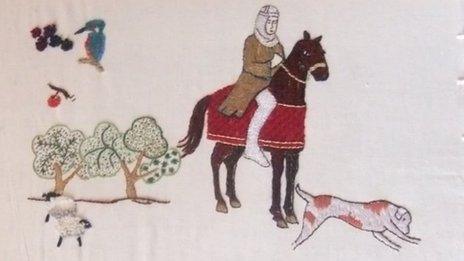Odiham unveils Magna Carta anniversary embroidered panel designs
- Published

The embroidery design shows King John riding out from the castle to Windsor on 10 June 1215
Stitchers from a Hampshire village with connections to the Magna Carta have unveiled designs for an embroidery panel depicting 800 years of history.
The Odiham panel will show scenes such as King John's departure to sign the historic charter and a famous heavyweight boxing match in 1788.
About 70 volunteers will spend two years stitching the panel for the Magna Carta's 800th anniversary in 2015.
King John left his castle at Odiham on 10 June 1215 for Runnymede in Surrey.
There the charter was sealed on around 15 June, before the king returned to Odiham on 26 June.
Napoleonic Wars
The following day, on 27 June 1215, a French translation of Magna Carta was sealed at Odiham. That is now kept in a nunnery in France.
Other embroidery features on the 2015 embroidery panel will depict visits by both Queen Elizabeth I and II, the founding of the veterinary profession in Britain, and French prisoners of war held on parole at Odiham and North Warnborough during the Napoleonic Wars.
John Champion, chair of Odiham Society, said: "The panel reflects the history of England as it was played out in this historic parish.
"This is very much a community project which will bring the heritage of the parish of Odiham alive for residents and visitors, young and old alike."
The panel was designed by local artist Mary Turner and is set to be ready for Odiham's Magna Carta anniversary celebrations on 22-25 May 2015.
King John built Odiham Castle as a stopping place where he could pursue his passion for hunting in its Royal Deer Park.
He rode out from the castle for Windsor on 10 June 1215, meeting baronial leaders in Runnymede and probably affixing his seal to the Articles of Barons on the same day.
This document formed the basis for Magna Carta, a document whose key clauses concerning liberty and justice have been adopted around the world.
- Published19 December 2012
- Published28 October 2012
- Published28 September 2012
- Published28 September 2012